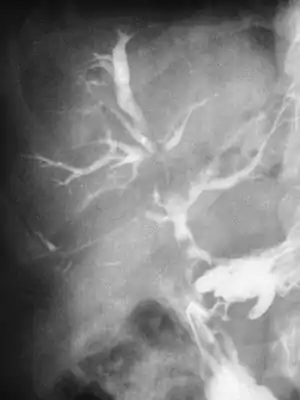Biliary fistula
A biliary fistula is a type of fistula in which bile flows along an abnormal connection from the bile ducts into nearby hollow structure. Types of biliary fistula include:
- bilioenteric fistula: abnormal connection to small bowel, usually duodenum.
- thoracobiliary fistula: abnormal connection to pleural space or bronchus (rare).
| Biliary fistula | |
|---|---|
 | |
| Duodeno Biliary Fistula | |
| Specialty | General surgery |
These may be contrasted to a bile leak, in which bile escapes the bile ducts through a perforation or faulty surgical anastomosis into the abdominal cavity. Damage to a bile duct may result in a leak, which may eventually become a biliary fistula.
Signs and symptoms
A biliary fistula often occurs in be suspected in a person who has recently undergone a surgical procedure. Pain may occur if the leaked bile is also infected, which can subsequently lead to biliary peritonitis.
Extensive ascites may accumulate, especially in the setting of sterile bile leakage, which is often asymptomatic in nature.
Causes
It can occur as a complication following biliary trauma (such as cholelithiasis),[1] as an iatrogenic effect or as a result of a penetrating injury.
Treatment
Cholecystectomy with a choledocoplasty is the most frequent treatment of primary fistulas, whereas the bile duct drainage or the endoscopic stenting is the best choice in case of minor iatrogenic bile duct injuries.
See also
References
- Duzgun, A. P.; Ozmen, M. M.; Ozer, M. V.; Coskun, F. (2007). "Internal biliary fistula due to cholelithiasis: a single-centre experience". World Journal of Gastroenterology. 13 (34): 4606–4609. doi:10.3748/wjg.v13.i34.4606. PMC 4611836. PMID 17729415.